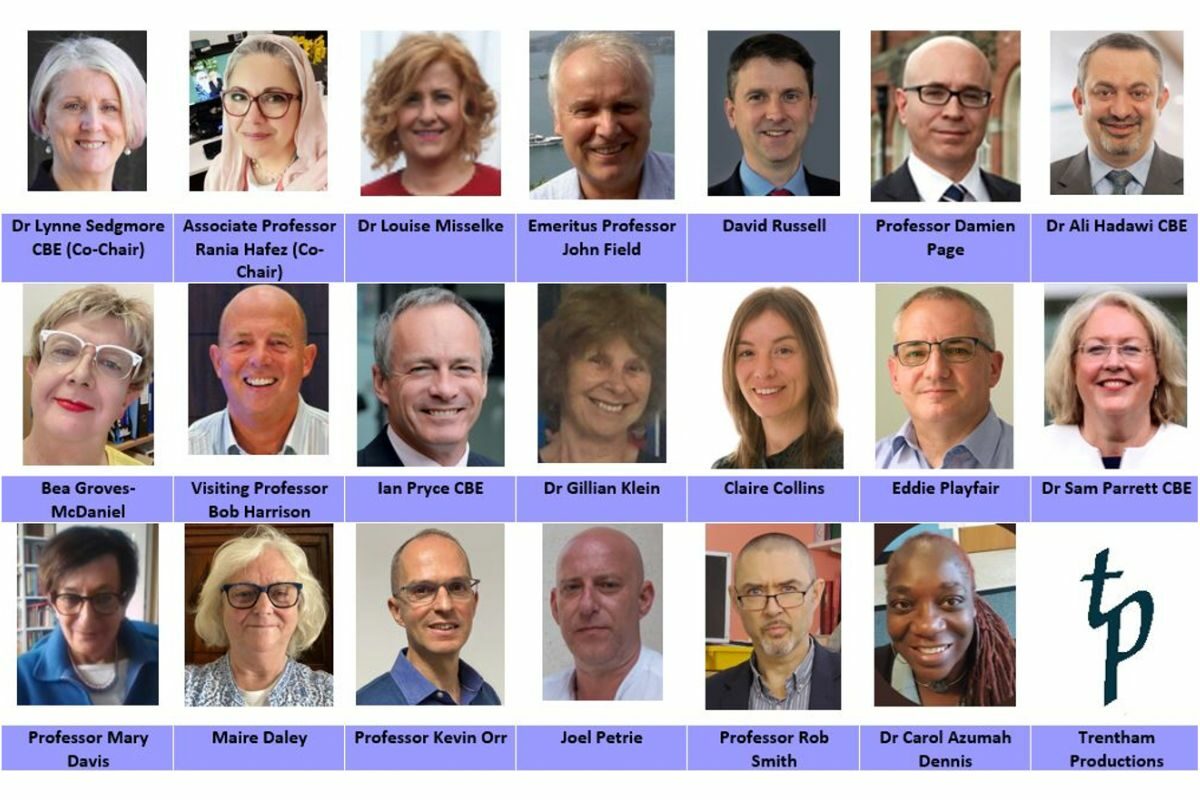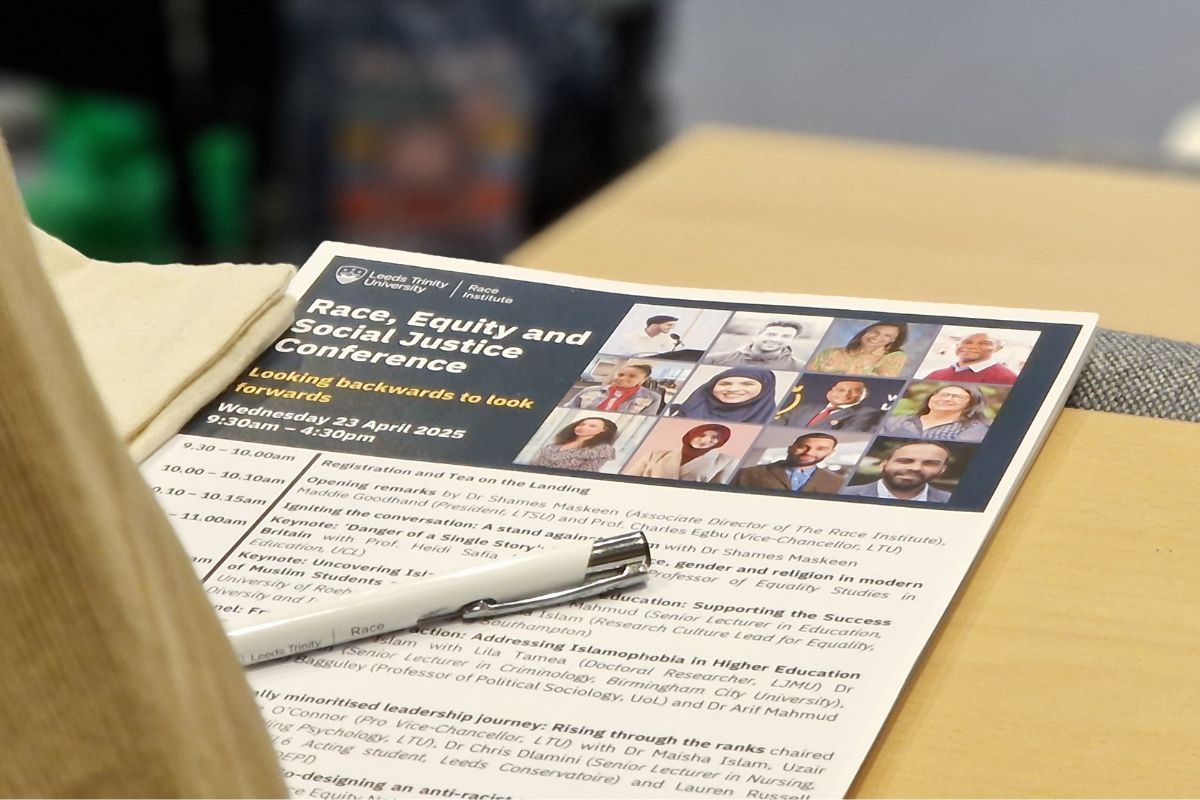Lessons learnt in developing a diverse board of trustees

FE News discusses Trentham Productions’ new Trustees and their approach to diversity and equality; with Trustees Professor Kevin Orr, Joel Petrie, Dr Lynne Sedgmore, Maire Daley, Professor Damien Page, Associate Professor Rania Hafez, Claire Collins, Professor Rob Smith, David Russell, Bea Groves-McDaniel and Eddie Playfair.
Gavin: The Trentham Productions Trustees are impressively diverse (50% Women, 25% LGBTQ+, 15% Black, and 5% Disabled). Why does this matter?
Kevin: It matters because society is diverse, FE is diverse, and so Trentham should be diverse.
Joel: We also hope it is a very clear public demonstration of our commitment to equality too. Trentham Books had an explicit and celebrated focus on issues such as Race and Gender. We intend to honour that legacy.
Gavin: In your experience is there a tendency in FE to make tokenistic Trustee and Board appointments. If yes, how do we move towards a more genuinely diverse FE thought leadership?
Lynne: When there is a genuine commitment to co-creating a diverse Board it is always possible. Where there is not sufficient commitment across FE boards we need to challenge that, and provide development opportunities to ensure a more diverse pool of thought and talent. Tokenism, bias and isms of all kinds have no place in FE.
Gavin: Many of Trentham’s Trustees are longstanding Natfhe and UCU equality activists. How might this impact on Trentham’s publications?
Maire: To borrow a quote from an earlier Trentham publication – FE and the Twelve Dancing Princesses, “resistance is fertile”. Activism in trade unions teaches us that any progress made requires constant monitoring as hard fought for gains can be lost very quickly. It remains the duty of boards such as this one to push forward the agenda and call out discrimination and abuse of power when we see it.
Gavin: Trentham states it wishes to be the ‘go to’ publisher for FE professionals after their Masters, MPhil, EdD and PhD research. How can you ensure a plurality of authors?
Damien: It’s a matter of not only stating that we welcome diversity, we will actively seek out diverse authors, building a network of targeted support, mentoring and barrier-breaking to ensure all voices can be heard, published and celebrated. We are a publisher of action instead of just good intentions.
Rania: Can I add that we’re going to be more than publishers, as the name Trentham Productions implies. We intend to foster a vibrant inclusive public space of ideas and debates that invites all those in FE to engage with and contribute to. Ours will be a platform that seeks to give equal access to all voices in FE; and that will include students not just staff in FE
Joel: Yes, and involving students was key to all three dancing princesses books, published by Trentham Books.
Gavin: You rebranded the press from Trentham Books to Productions, to reflect an aspiration to offer events and professional learning. How could Trentham ensure that any CPD is inclusive?
Claire: There are many ways to understand inclusion; from grounding CPD in people’s own contexts and lives (and positioning them as knowers in this respect) to ensuring people who are carers or are disabled can attend (i.e. thinking about blended and asynchronous approaches, as well as in person activity). We can do our best, but the key is we have broad lived experience to draw from across the trustees and steering group and we will keep asking what we can do to better include FE colleagues.
Joel: I’d add that having diverse people who facilitate professional learning is important too, Claire. In nearly 30 years of work in FE I don’t ever recall a session of CPD led by a Black colleague, for instance.
Gavin: Several of the Trustees were significantly involved in the IfL and the broader professionalism agenda. How might Trentham Productions progress FE professionalism?
Bea: If professionalism means anything sensible at all, it refers to the capacity for individuals to make independently rational, informed, evidenced and humane decisions within their work role. This has a habit of clashing with the current culture of the UK post-compulsory education sector. The sector is overwhelmed by punitive uniformity (often driven by financial requirements instead of the needs of teachers themselves).
Uniformity stymies criticality and imagination. It limits the teaching role to one of drone-like obedience to authority. Much that could be done to improve teaching and learning is lost in the rush to stay within the lines of ‘acceptable’ discourse. But there is a very strong requirement to support critical praxis, and I believe that Trentham has a clear opportunity to open up its own access to a public sphere where true professionalism can reign free.
David: FE has been stuck for decades in a place where it both gets “done to” and simultaneously protests against that i.e. it “resists”. Teachers, leaders, academics, activists and onlookers all cry out for its abusers to stop their cyclical, under-theorised meddling and instead let it flourish. This will never happen until someone makes the first move in a new direction. Government and FE are trapped in a master-slave dialectic that Hegel would have despaired to see, which enslaves the ‘abusers’ – Government, employers – as much as the ‘abused’: FE practitioners.
The only way to break out of this is for FE to stop railing against external forces and instead take control of its own destiny. A self-improving system is not the path to success, it IS success. And a vital feature of a self-improving system is that the artificial gap between creators of the narrative – academics, politicians, commentators – and creators of impact including teachers, leaders, educators’ is abolished. Trentham is part of this process – when the characters on the page take control of the novel the whole game changes.
Gavin: Trentham claims to be a fundamentally democratic organisation. Rania you recently, with Lynne, stood to be the Chair of Trentham’s Trustees. Does this actually matter, or would it have been equally valid to simply appoint a Chair?
Rania: Of course this matters because Trentham aims to embody the values it advocates for. Democracy isn’t just about voting, it is about an inclusive public space where voices are heard, whether one has a protected characteristic or not. Putting myself forward for the position of chair was my way of showing my commitment to Trentham and to supporting its future role in the sector. It also sets a precedent for future boards, and reaffirms our inclusive democratic credentials.
Gavin: Are Trentham’s Trustees diverse in any other respect?
Joel: Yes. We were very careful who we invited. For instance, we are committed to publishing research from all of the UK nations, and beyond. One of our Trustees, David Russell of the ETF, is a Scot; and another is Emeritus Professor John Field who has considerable reach in international VET and Lifelong Learning.
Gavin: In equality terms class is not a protected characteristic, but is clearly a massive consideration in FE. How might Trentham foreground working class writers who work in FE?
Rania: Class is one of the least addressed areas of inclusion. It frustrates me no end how class is mostly excluded from issues of access and equity.
Lynne: We intend to make class an explicit strand to encourage interested FE working class writers to explore class in exciting and innovative ways.
Gavin: Several of your Trustees are professors. What can workers in HE do to support the research aspirations of their colleagues in FE?
Rob: Informally, we can offer support to individuals through discussion and encouragement. My role centres on designing research projects through discussion with students. Mainly I work with doctoral students, but masters level too.
Gavin: So is there a role for research between HE lecturers and their FE colleagues? Is this a way to promote equality and some parity?
Rob: Absolutely. I am involved in discussions like this via TTL (Transformative Teaching and Learning) scholarship on a weekly basis with Professor Vicky Duckworth, who is on Trentham’s Steering Committee.
Rania: It should also be noted that there are existing forums for collaboration on research across FE and HE; such as the Learning and Skills Research Network (LSRN). I happen to be co-chair of the London branch, and three Trentham trustees were LSRN Regional Coordinators too in the past.
Gavin: There are several employees of sector bodies amongst Trentham’s Trustees, including the AoC and ETF. How might sector bodies support Trentham’s aspiration to promote equality and diversity in the sector?
Eddie: Trentham books have been very influential on my development and thinking over many years, so I’m really delighted to be a Trentham trustee and to be able to help shape its future. I’m here in a personal capacity but it will be useful to have a link with AoC and to share ideas in both directions. Equality and social justice are key to the FE mission and AoC is very committed to supporting the kind of systemic change needed in our sector to advance equality.
Gavin: Are there any lessons to be learnt for the future of FE boards and Governance from Trentham’s experience?
Joel: Yes. Equality isn’t rocket science. It is perfectly possible to appoint both on merit and to ensure diversity. It just takes will. It is also essential that rhetoric matches reality: amongst our first commissions is the life story of Dr Wally Brown CBE, one of the first Black FE Principals. We start as we mean to go on.
By Trentham Productions Trustees Professor Kevin Orr, Joel Petrie, Dr Lynne Sedgmore, Maire Daley, Professor Damien Page, Associate Professor Rania Hafez, Claire Collins, Professor Rob Smith, David Russell, Bea Groves-McDaniel and Eddie Playfair.











Responses